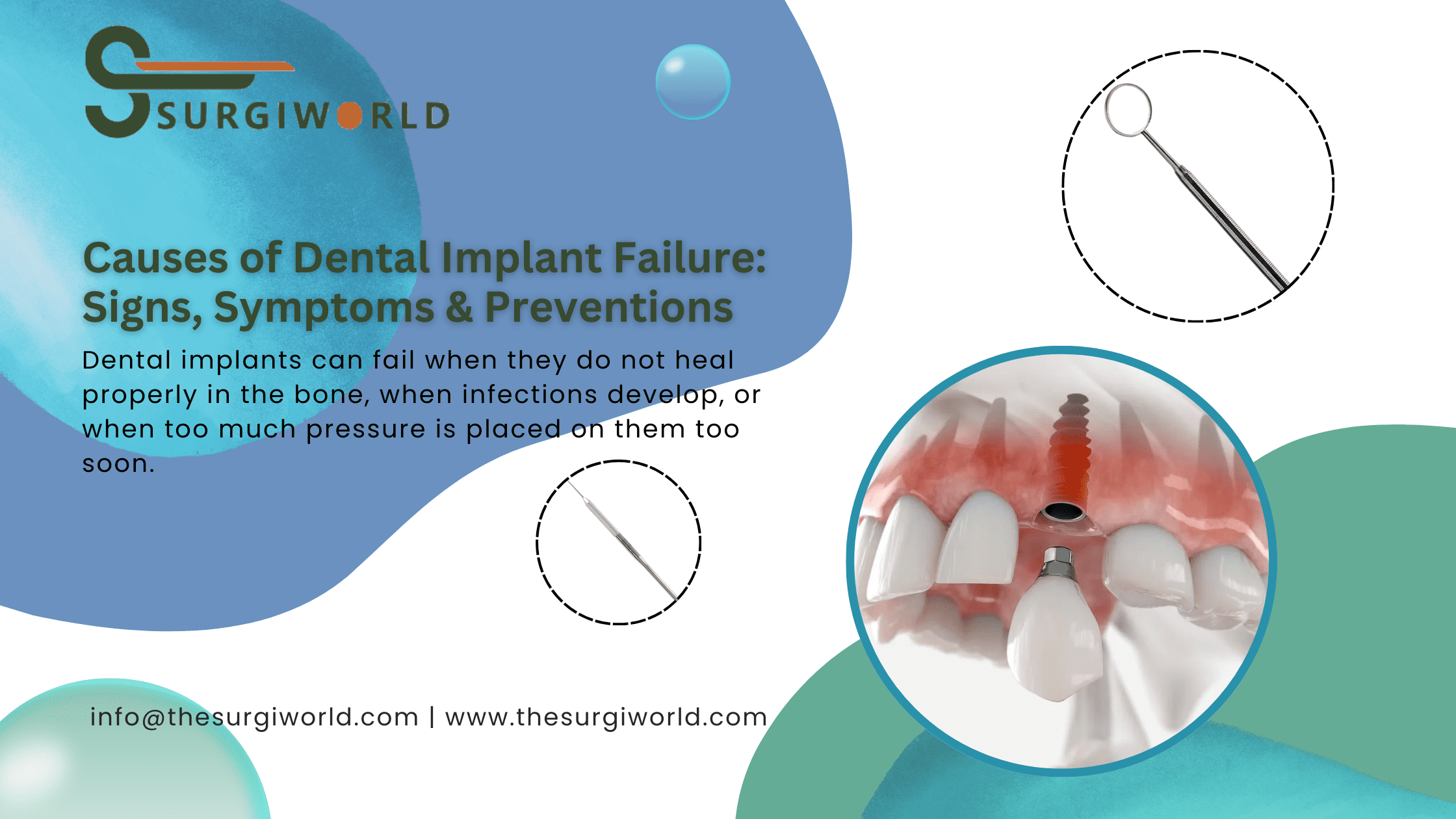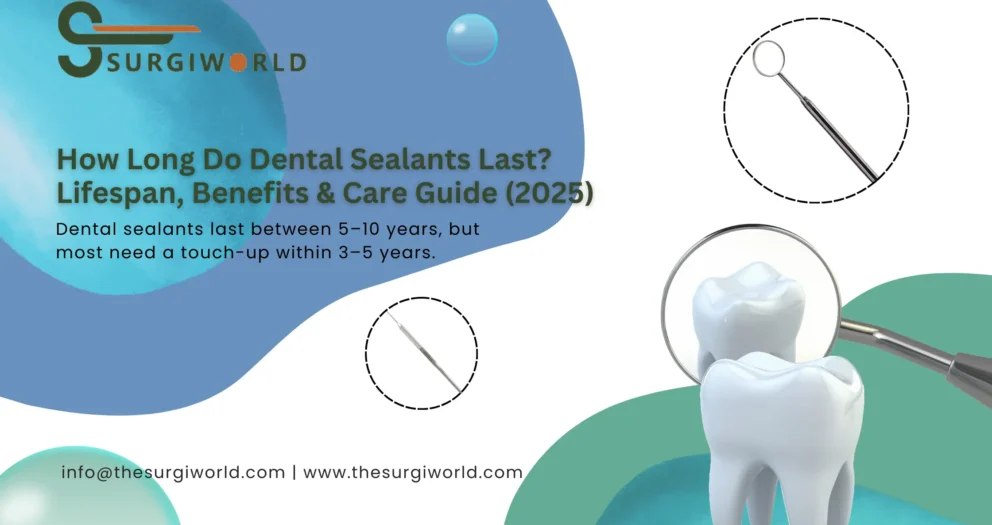Dental implants can fail when they do not heal properly in the bone, when infections develop, or when too much pressure is placed on them too soon. The most common causes of dental implant failure include poor oral hygiene, smoking, uncontrolled medical conditions, infection (peri-implantitis), nerve or sinus complications, and even long-term neglect. Although dental implant failure is rare, understanding the causes, symptoms, and failure rate helps patients take the right steps to prevent problems.
Dental implants are one of the most trusted ways to replace missing teeth, with success rates above 90–95%. Still, some patients experience problems such as loose implants, infections, or implants that fail to bond with the jawbone. People often ask: “Why do dental implants fail?” or “What are the signs of dental implant rejection?” or even “What happens if a dental implant fails?”
The truth is that implant failure can happen early (during the healing stage) or later (months or years afterward). Early implant failure may be caused by poor osseointegration (bone not fusing), infection, or improper surgical technique. Long-term or late failures are often due to gum disease, bone loss, smoking, poor maintenance, or medical conditions like diabetes.
Also Read: Natural Looking Dental Implants
In this guide, we’ll explain:
- The top causes of dental implant failure (from infections to surgical errors).
- Signs and symptoms to watch for, like swelling, throbbing pain, or loose implants.
- How often dental implants fail and what failure rates to expect.
- What happens if your body rejects an implant, and whether it can be saved.
- Treatment and prevention strategies to reduce risk and protect your investment.
Common Causes of Dental Implant Failure
- Poor Osseointegration – bone does not fuse with the implant post.
- Infection (Peri-implantitis) – bacteria around the implant site causes swelling and bone loss.
- Smoking & Lifestyle Habits – slows healing, reduces blood flow, and raises infection risk.
- Uncontrolled Medical Conditions – diabetes, osteoporosis, or immune disorders.
- Surgical Errors – poor placement, overheating bone during drilling, or nerve injury.
- Excessive Pressure – chewing or teeth grinding (bruxism) too early.
- Sinus & Nerve Complications – implant placed too close to sinus cavity or nerve pathways.
Also make sure about the dental tools, & Try that you & your dentists are using Dental hygiene tools For tooth health.
Signs & Symptoms of Implant Failure
Knowing the signs helps catch problems early:
- Persistent pain or throbbing after 2 weeks.
- Swelling, redness, or pus around the gum.
- Loose or wobbly implant.
- Numbness or tingling (possible nerve damage).
- Gum recession or implant screw showing through gum.
These symptoms may mean early dental implant failure or rejection and require immediate dentist attention.
Implant Rejection & Body Response
- Yes, your body can reject a dental implant, though it is rare.
- Rejection often happens due to allergic reaction to titanium or poor bone compatibility.
- Signs of rejection: swelling, sharp pain, loosening, or implant not healing.
Dental Implant Failure Rate
- Success rate: 90–95%.
- Failure rate: 5–10% depending on health, oral hygiene, and surgeon experience.
- Higher risk groups: smokers, uncontrolled diabetics, patients with gum disease.
Read: How long does numbness last after dental implant
Early vs Late Failure
Early Failure (first weeks–months):
- Infection, surgical mistakes, poor bone healing, overloading.
Late Failure (years later):
- Gum disease, bone loss, poor maintenance, implant wear-and-tear.
Table: Early vs Late Dental Implant Failure
| Stage | Common Causes | Key Symptoms | Prevention |
| Early Failure | Infection, poor bone healing, surgical errors | Pain, swelling, implant loosening | Good hygiene, skilled surgeon, follow aftercare |
| Late Failure | Gum disease, bone loss, smoking, neglect | Gum recession, loose implant, bone shrinkage | Regular dental visits, stop smoking, oral hygiene |
How & What | About Dental Implant Failure
1. How can you tell if a dental implant is failing?
Look for pain, swelling, gum recession, or a loose implant.
2. How often do dental implants fail?
About 5–10% of implants may fail, but proper care lowers the risk.
3. Can dental implants be rejected by the body?
Yes, though rare. Symptoms include persistent swelling, pain, and implant loosening.
4. What happens if a dental implant fails?
It may be removed, treated for infection, and replaced later.
5. What are the most common problems with dental implants?
Infections, bone loss, and poor placement.
6. What is the most common cause of dental implant failure?
Infection (peri-implantitis) and poor osseointegration are the top causes.
7. How to prevent a dental implant from failing?
Maintain daily oral hygiene, avoid smoking, attend regular dental visits, and follow your dentist’s aftercare instructions carefully.
8. How to get strong teeth and gums?
Brush twice a day, floss, eat a nutrient-rich diet, and avoid sugary foods. Regular dental cleanings also keep your gums and bone strong.
9. Does the final stage of a dental implant hurt?
Most patients only feel mild soreness when the crown is placed. Any discomfort usually fades within a few days.
What Happens If a Dental Implant Fails?
- Implant may need to be removed.
- Bone grafting or new implant placement after healing.
- Sometimes the crown/abutment is replaced instead of the implant screw.
- Failure treatment depends on whether it’s early or late stage.
How to Prevent Dental Implant Failure
- Brush and floss daily.
- Use antibacterial mouthwash.
- Quit smoking and reduce alcohol.
- Follow all dentist’s post-op instructions.
- Attend regular checkups.
- Choose an experienced dentist using sterile, high-quality instruments.
Wanna Know: Why dental implants are so expensive
Questions That Clients Usually Asked
How can you tell if a dental implant is failing?
Look for pain, swelling, gum recession, or a loose implant.
How often do dental implants fail?
About 5–10% of implants may fail, but proper care lowers the risk.
Can your body reject dental implants?
Yes, though rare. Symptoms include persistent swelling, pain, and implant loosening.
What happens if dental implant fails?
It may be removed, treated for infection, and replaced later.
What are the most common problems with dental implants?
Infections, bone loss, and poor placement.
What is the most common cause of dental implant failure?
Infection (peri-implantitis) and poor osseointegration are the top causes.
> Checkout what we are offering By clicking on Dental Instruments







Write a comment
You must be logged in to post a comment.